formerly eScholarship Editions


|
|
|
|
Your request for similar items found 20 book(s). | Modify Search | Displaying 1 - 20 of 20 book(s) | |
| 1. |  | Title: The gender of the gift: problems with women and problems with society in Melanesia Author: Strathern, Marilyn Published: University of California Press, 1988 Subjects: Anthropology | South Asia | Women's Studies | Pacific Rim Studies Publisher's Description: In the most original and ambitious synthesis yet undertaken in Melanesian scholarship, Marilyn Strathern argues that gender relations have been a particular casualty of unexamined assumptions held by Western anthropologists and feminist scholars alike. The book treats with equal seriousness - and with equal good humor - the insights of Western social science, feminist politics, and ethnographic reporting, in order to rethink the representation of Melanesian social and cultural life. This makes The Gender of the Gift one of the most sustained critiques of cross-cultural comparison that anthropology has seen, and one of its most spirited vindications. [brief] Similar Items |
| 2. | 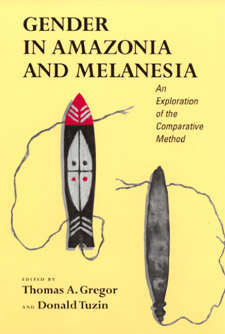 | Title: Gender in Amazonia and Melanesia: an exploration of the comparative method Author: Gregor, Thomas Published: University of California Press, 2001 Subjects: Anthropology | Gender Studies | Geography Publisher's Description: One of the great riddles of cultural history is the remarkable parallel that exists between the peoples of Amazonia and those of Melanesia. Although the two regions are separated by half a world in distance and at least 40,000 years of history, their cultures nonetheless reveal striking similarities in the areas of sex and gender. In both Amazonia and Melanesia, male-female differences infuse social organization and self-conception. They are the core of religion, symbolism, and cosmology, and they permeate ideas about body imagery, procreation, growth, men's cults, and rituals of initiation. The contributors to this innovative volume illuminate the various ways in which sex and gender are elaborated, obsessed over, and internalized, shaping subjective experiences common to entire cultural regions, and beyond. Through comparison of the life ways of Melanesia and Amazonia the authors expand the study of gender, as well as the comparative method in anthropology, in new and rewarding directions. [brief] Similar Items |
| 3. |  | Title: Writing at the margin: discourse between anthropology and medicine Author: Kleinman, Arthur Published: University of California Press, 1997 Subjects: Anthropology | Medical Anthropology | Sociology | Medicine | Asian Studies | Social Problems Publisher's Description: One of the most influential and creative scholars in medical anthropology takes stock of his recent intellectual odysseys in this collection of essays. Arthur Kleinman, an anthropologist and psychiatrist who has studied in Taiwan, China, and North America since 1968, draws upon his bicultural, multidisciplinary background to propose alternative strategies for thinking about how, in the postmodern world, the social and medical relate. Writing at the Margin explores the border between medical and social problems, the boundary between health and social change. Kleinman studies the body as the mediator between individual and collective experience, finding that many health problems - for example the trauma of violence or depression in the course of chronic pain - are less individual medical problems than interpersonal experiences of social suffering. He argues for an ethnographic approach to moral practice in medicine, one that embraces the infrapolitical context of illness, the responses to it, the social institutions relating to it, and the way it is configured in medical ethics.Previously published in various journals, these essays have been revised, updated, and brought together with an introduction, an essay on violence and the politics of post-traumatic stress disorder, and a new chapter that examines the contemporary ethnographic literature of medical anthropology. [brief] Similar Items |
| 4. |  | Title: Pathways of power: building an anthropology of the modern world Author: Wolf, Eric R 1923- Published: University of California Press, 2001 Subjects: Anthropology | Cultural Anthropology | Sociology Publisher's Description: This collection of twenty-eight essays by renowned anthropologist Eric R. Wolf is a legacy of some of his most original work, with an insightful foreword by Aram Yengoyan. Of the essays, six have never been published and two have not appeared in English until now. Shortly before his death, Wolf prepared introductions to each section and individual pieces, as well as an intellectual autobiography that introduces the collection as a whole. Sydel Silverman, who completed the editing of the book, says in her preface, "He wanted this selection of his writings over the past half-century to serve as part of the history of how anthropology brought the study of complex societies and world systems into its purview." [brief] Similar Items |
| 5. |  | Title: An anthropology of the subject: holographic worldview in New Guinea and its meaning and significance for the world of anthropology Author: Wagner, Roy Published: University of California Press, 2001 Subjects: Anthropology | Pacific Rim Studies | Geography | Cultural Anthropology | Folklore and Mythology Publisher's Description: An Anthropology of the Subject rounds out the theoretical-philosophical cosmos of one of the twentieth century's most intellectually adventurous anthropologists. Roy Wagner, having turned "culture" and "symbols" inside out (in The Invention of Culture and Symbols That Stand for Themselves, respectively), now does the same for the "subject" and subjectivity. In studying the human subject and the way human culture mirrors itself, Wagner has redefined holography as "the exact equivalence, or comprehensive identity, of part and whole in any human contingency." [brief] Similar Items |
| 6. | 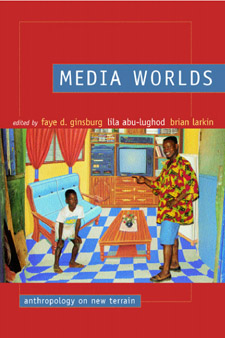 | Title: Media worlds: anthropology on new terrain Author: Ginsburg, Faye D Published: University of California Press, 2002 Subjects: Anthropology | Media Studies | Cultural Anthropology | Electronic Media | Postcolonial Studies | Ethnic Studies | Gender Studies | Sociology | Sociology | Sociology Publisher's Description: This groundbreaking volume showcases the exciting work emerging from the ethnography of media, a burgeoning new area in anthropology that expands both social theory and ethnographic fieldwork to examine the way media - film, television, video - are used in societies around the globe, often in places that have been off the map of conventional media studies. The contributors, key figures in this new field, cover topics ranging from indigenous media projects around the world to the unexpected effects of state control of media to the local impact of film and television as they travel transnationally. Their essays, mostly new work produced for this volume, bring provocative new theoretical perspectives grounded in cross-cultural ethnographic realities to the study of media. [brief] Similar Items |
| 7. |  | Title: Wage, trade, and exchange in Melanesia: a Manus society in the modern state Author: Carrier, James G Published: University of California Press, 1989 Subjects: Anthropology Publisher's Description: Ponam Island, a small community in Manus Province, Papua New Guinea, is the subject of this innovative study. The authors extend the criticism within anthropology of ethnographies that attempt to analyze village communities without reference to the nations of which they are a part, and that equate the traditional and the exotic with the untouched. They do so by describing the links between a peripheral village society and Papua New Guinea's national economy and institutions, in a way that will interest all those concerned with development and underdevelopment.The analysis focuses on major socioeconomic areas of village life: education, migration, wage employment, and remittance; trade, commerce, and exchange; subsistence fishing; ceremonial exchange. The authors' findings challenge the idea that colonial and Western-oriented encroachment leads to the decay of village societies or to their adopting Western values and practices. Ponam has been under significant Western influence for almost a century, yet the society has not decayed. It remains flourishing and generative, uniquely itself and neither blindly traditional nor mindlessly Western. [brief] Similar Items |
| 8. | 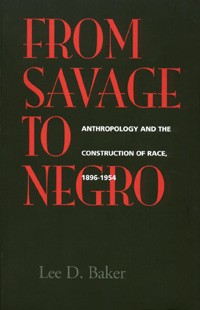 | Title: From savage to Negro: anthropology and the construction of race, 1896-1954 Author: Baker, Lee D 1966- Published: University of California Press, 1998 Subjects: Anthropology | Cultural Anthropology | Ethnic Studies | African American Studies | United States History | Sociology Publisher's Description: Lee D. Baker explores what racial categories mean to the American public and how these meanings are reinforced by anthropology, popular culture, and the law. Focusing on the period between two landmark Supreme Court decisions - Plessy v. Ferguson (the so-called "separate but equal" doctrine established in 1896) and Brown v. Board of Education (the public school desegregation decision of 1954) - Baker shows how racial categories change over time.Baker paints a vivid picture of the relationships between specific African American and white scholars, who orchestrated a paradigm shift within the social sciences from ideas based on Social Darwinism to those based on cultural relativism. He demonstrates that the greatest impact on the way the law codifies racial differences has been made by organizations such as the NAACP, which skillfully appropriated the new social science to exploit the politics of the Cold War. [brief] Similar Items |
| 9. | 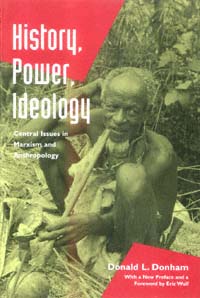 | Title: History, power, ideology: central issues in Marxism and anthropology Author: Donham, Donald L. (Donald Lewis) Published: University of California Press, 1999 Subjects: Anthropology | Social Theory | African Studies Publisher's Description: Is Marxism a reflection of the conceptual system it fights against, rather than a truly comprehensive approach to human history? Drawing on recent work in anthropology, history, and philosophy, Donald Donham confronts this problem in analyzing a radically different social order: the former Maale kingdom of southern Ethiopia."Every once in a while there appears a book that . . . opens up new ways of inquiring into the ways of the world. Donald Donham has written such a book. The style is quiet and judicious, but the effect is stunning. . . . In putting inherited partisan approaches to the test of explaining the realities of Maale society and culture, Donham enriches anthropology and imparts new vigor to the analytical Marxian traditions. History, Power, Ideology embodies a major accomplishment." - From the Foreword [brief] Similar Items |
| 10. | 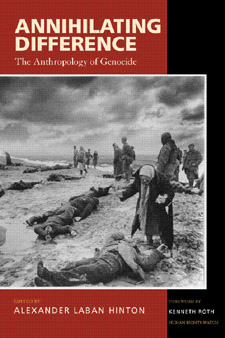 | Title: Annihilating difference: the anthropology of genocide Author: Hinton, Alexander Laban Published: University of California Press, 2002 Subjects: Anthropology | African Studies | Asian Studies | Ethnic Studies | Gender Studies | History | Sociology | Media Studies | Religion | Religion Publisher's Description: Genocide is one of the most pressing issues that confronts us today. Its death toll is staggering: over one hundred million dead. Because of their intimate experience in the communities where genocide takes place, anthropologists are uniquely positioned to explain how and why this mass annihilation occurs and the types of devastation genocide causes. This ground breaking book, the first collection of original essays on genocide to be published in anthropology, explores a wide range of cases, including Nazi Germany, Cambodia, Guatemala, Rwanda, and Bosnia. [brief] Similar Items |
| 11. |  | Title: Genetic nature/culture: anthropology and science beyond the two-culture divide Author: Goodman, Alan H Published: University of California Press, 2003 Subjects: Anthropology | Biology | Sociology Publisher's Description: The so-called science wars pit science against culture, and nowhere is the struggle more contentious - or more fraught with paradox - than in the burgeoning realm of genetics. A constructive response, and a welcome intervention, this volume brings together biological and cultural anthropologists to conduct an interdisciplinary dialogue that provokes and instructs even as it bridges the science/culture divide. Individual essays address issues raised by the science, politics, and history of race, evolution, and identity; genetically modified organisms and genetic diseases; gene work and ethics; and the boundary between humans and animals. The result is an entree to the complicated nexus of questions prompted by the power and importance of genetics and genetic thinking, and the dynamic connections linking culture, biology, nature, and technoscience. The volume offers critical perspectives on science and culture, with contributions that span disciplinary divisions and arguments grounded in both biological perspectives and cultural analysis. An invaluable resource and a provocative introduction to new research and thinking on the uses and study of genetics, Genetic Nature/Culture is a model of fruitful dialogue, presenting the quandaries faced by scholars on both sides of the two-cultures debate. [brief] Similar Items |
| 12. | 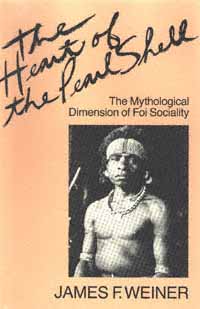 | Title: The heart of the pearl shell: the mythological dimension of Foi sociality Author: Weiner, James F Published: University of California Press, 1988 Subjects: Anthropology Publisher's Description: For the Foi people who live on the edge of the central highlands of Papua New Guinea, the flow of pearl shells is the "heart" of their social life. The pearl shell is the exchange item that mediates the creation of their most important sexual and social roles. The Heart of the Pearl Shell analyzes a number of myths of the Foi people, elegantly bringing together significant ethnographic materials in a way that has important implications for the development of social theory in anthropology and in Melanesian studies. Scholars of semiotic-symbolic anthropology and of comparative religion will also share the author's interest in the meaning and role of mythology in Foi culture.Instead of relying on orthodox methods of Freudian or structuralist interpretation, James Weiner assumes there is a dialectical relationship between the images of Foi myth and the images of the Foi's social world. He demonstrates how each set of these images is dependent upon the other for its creation. This innovative study locates Foi social meaning in the re-creation and attempted solution of the moral dilemmas that are crystallized in mythology and other poetic usages. [brief] Similar Items |
| 13. |  | Title: The life of the law: anthropological projects Author: Nader, Laura Published: University of California Press, 2002 Subjects: Anthropology | Law Publisher's Description: Laura Nader, an instrumental figure in the development of the field of legal anthropology, investigates an issue of vital importance for our time: the role of the law in the struggle for social and economic justice. In this book she gives an overview of the history of legal anthropology and at the same time urges anthropologists, lawyers, and activists to recognize the centrality of law in social change. Nader traces the evolution of the plaintiff's role in the United States in the second half of the twentieth century and passionately argues that the atrophy of the plaintiff's power during this period represents a profound challenge to justice and democracy. Taking into account the vast changes wrought in both anthropology and the law by globalization, Nader speaks to the increasing dominance of large business corporations and the prominence of neoliberal ideology and practice today. In her discussion of these trends, she considers the rise of the alternative dispute resolution movement, which since the 1960s has been part of a major overhaul of the U.S. judicial system. Nader links the increasing popularity of this movement with the erosion of the plaintiff's power and suggests that mediation as an approach to conflict resolution is structured to favor powerful--often corporate--interests. [brief] Similar Items |
| 14. | 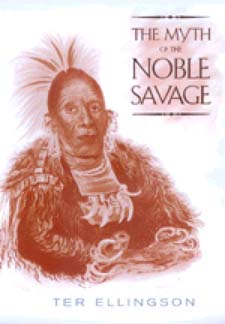 | Title: The myth of the noble savage Author: Ellingson, Terry Jay Published: University of California Press, 2001 Subjects: Anthropology | Cultural Anthropology | Intellectual History | European History | American Studies | European Studies | Postcolonial Studies Publisher's Description: In this important and original study, the myth of the Noble Savage is an altogether different myth from the one defended or debunked by others over the years. That the concept of the Noble Savage was first invented by Rousseau in the mid-eighteenth century in order to glorify the "natural" life is easily refuted. The myth that persists is that there was ever, at any time, widespread belief in the nobility of savages. The fact is, as Ter Ellingson shows, the humanist eighteenth century actually avoided the term because of its association with the feudalist-colonialist mentality that had spawned it 150 years earlier. The Noble Savage reappeared in the mid-nineteenth century, however, when the "myth" was deliberately used to fuel anthropology's oldest and most successful hoax. Ellingson's narrative follows the career of anthropologist John Crawfurd, whose political ambition and racist agenda were well served by his construction of what was manifestly a myth of savage nobility. Generations of anthropologists have accepted the existence of the myth as fact, and Ellingson makes clear the extent to which the misdirection implicit in this circumstance can enter into struggles over human rights and racial equality. His examination of the myth's influence in the late twentieth century, ranging from the World Wide Web to anthropological debates and political confrontations, rounds out this fascinating study. [brief] Similar Items |
| 15. | 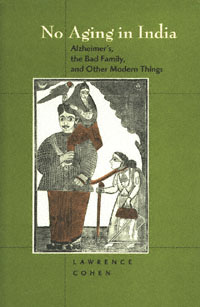 | Title: No aging in India: Alzheimer's, the bad family, and other modern things Author: Cohen, Lawrence 1961- Published: University of California Press, 1998 Subjects: Anthropology | Medical Anthropology | Aging | South Asia Publisher's Description: From the opening sequence, in which mid-nineteenth-century Indian fishermen hear the possibility of redemption in an old woman's madness, No Aging in India captures the reader with its interplay of story and analysis. Drawing on more than a decade of ethnographic work, Lawrence Cohen links a detailed investigation of mind and body in old age in four neighborhoods of the Indian city of Varanasi (Banaras) with events and processes around India and around the world. This compelling exploration of senility - encompassing not only the aging body but also larger cultural anxieties - combines insights from medical anthropology, psychoanalysis, and postcolonial studies. Bridging literary genres as well as geographic spaces, Cohen responds to what he sees as the impoverishment of both North American and Indian gerontologies - the one mired in ambivalence toward demented old bodies, the other insistent on a dubious morality tale of modern families breaking up and abandoning their elderly. He shifts our attention irresistibly toward how old age comes to matter in the constitution of societies and their narratives of identity and history. [brief] Similar Items |
| 16. |  | Title: Public faces, private voices: community and individuality in South India Author: Mines, Mattison 1941- Published: University of California Press, 1994 Subjects: Anthropology | Cultural Anthropology | South Asia Publisher's Description: Individuality is often viewed as an exclusively Western value. In non-Western societies, collective identities seem to eclipse those of individuals. These generalities, however, have overlooked the importance of personal uniqueness, volition, and achievement in these cultures. As an anthropologist in Tamil Nadu, South India, Mattison Mines found private and public expressions of self in all sectors of society. Based on his twenty-five years of field research, Public Faces, Private Voices weaves together personal life stories, historical description, and theoretical analysis to define individuality in South Asia and to distinguish it from its Western counterpart.This engaging and controversial book will be of great interest to scholars and students working in anthropology, psychology, sociology, South Asian history, urban studies, and political science. [brief] Similar Items |
| 17. |  | Title: Paths to Asian medical knowledge Author: Leslie, Charles M 1923- Published: University of California Press, 1992 Subjects: Anthropology | Medical Anthropology | Asian Studies Publisher's Description: Like its classic predecessor, Asian Medical Systems , Paths to Asian Medical Knowledge significantly expands the study of Asian medicine. These essays ask how patients and practitioners know what they know - what evidence of disease or health they consider convincing and what cultural traditions and symbols guide their thinking. Whether discussing Japanese anatomy texts, Islamic humoralism, Ayurvedic clinical practice, or a variety of other subjects, the authors offer an exciting range of information and suggest new theoretical avenues for medical anthropology. [brief] Similar Items |
| 18. | 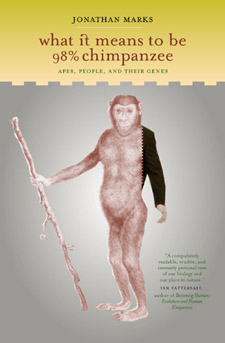 | Title: What it means to be 98% chimpanzee: apes, people, and their genes Author: Marks, Jonathan (Jonathan M.) 1955- Published: University of California Press, 2002 Subjects: EcologyEvolutionEnvironment | Evolution | Physical Anthropology | Sociology | Medicine | Mammalogy Publisher's Description: The overwhelming similarity of human and ape genes is one of the best-known facts of modern genetic sciencenm. But what does this similarity mean? Does it, as many have suggested, have profound implications for understanding human nature? Well-known molecular anthropologist Jonathan Marks uses the human-versus-ape controversy as a jumping-off point for a radical reassessment of a range of provocative issues--from the role of science in society to racism, animal rights, and cloning. Full of interesting facts, fascinating personalities, and vivid examples that capture times and places, this work explains and demystifies human genetic science--showing ultimately how it has always been subject to social and political influences and teaching us how to think critically about its modern findings. Marks presents the field of molecular anthropology--a synthesis of the holistic approach of anthropology with the reductive approach of molecular genetics--as a way of improving our understanding of the science of human evolution. As he explores the intellectual terrain of this field, he lays out its broad areas of interest with issues ranging from the differences between apes and humans to the biological and behavioral variations expressed in humans as a species. Marks confronts head-on the problems of racial classification in science. He describes current theories about race and uses work in primatology, comparative anatomy, and molecular anthropology to debunk them. He also sheds new light on the controversial Great Ape Project, the Human Genome Diversity Project, and much more. This iconoclastic, witty, and extremely readable book illuminates the deep background of human variation and asks us to reconsider the role of science in modern society. [brief] Similar Items |
| 19. | 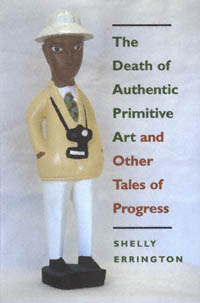 | Title: The death of authentic primitive art and other tales of progress Author: Errington, Shelly 1944- Published: University of California Press, 1998 Subjects: Anthropology | Cultural Anthropology | Art History | Architectural History | Art Theory Publisher's Description: In this lucid, witty, and forceful book, Shelly Errington argues that Primitive Art was invented as a new type of art object at the beginning of the twentieth century but that now, at the century's end, it has died a double but contradictory death. Authenticity and primitivism, both attacked by cultural critics, have died as concepts. At the same time, the penetration of nation-states, the tourist industry, and transnational corporations into regions that formerly produced these artifacts has severely reduced supplies of "primitive art," bringing about a second "death."Errington argues that the construction of the primitive in the nineteenth and twentieth centuries (and the kinds of objects chosen to exemplify it) must be understood as a product of discourses of progress - from the nineteenth-century European narrative of technological progress, to the twentieth-century narrative of modernism, to the late- twentieth-century narrative of the triumph of the free market. In Part One she charts a provocative argument ranging through the worlds of museums, art theorists, mail-order catalogs, boutiques, tourism, and world events, tracing a loosely historical account of the transformations of meanings of primitive art in this century. In Part Two she explores an eclectic collection of public sites in Mexico and Indonesia - a national museum of anthropology, a cultural theme park, an airport, and a ninth-century Buddhist monument (newly refurbished) - to show how the idea of the primitive can be used in the interests of promoting nationalism and economic development.Errington's dissection of discourses about progress and primitivism in the contemporary world is both a lively introduction to anthropological studies of art institutions and a dramatic new contribution to the growing field of cultural studies. [brief] Similar Items |
| 20. | 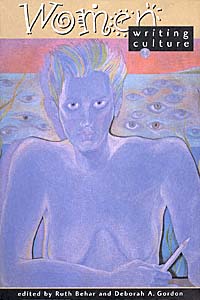 | Title: Women writing culture Author: Behar, Ruth 1956- Published: University of California Press, 1996 Subjects: Gender Studies | Gender Studies | Women's Studies | Sociology Publisher's Description: In this collection of new reflections on the sexual politics, racial history, and moral predicaments of anthropology, feminist scholars explore a wide range of visions of identity and difference. How are feminists redefining the poetics and politics of ethnography? What are the contradictions of women studying women? How have gender, race, class, and nationality been scripted into the canon?Through autobiography, fiction, historical analysis, experimental essays, and criticism, the contributors offer exciting responses to these questions. Several pieces reinvestigate the work of key women anthropologists like Elsie Clews Parsons, Margaret Mead, and Ruth Benedict, while others reevaluate the writings of women of color like Zora Neale Hurston, Ella Deloria, and Alice Walker. Some selections explore how sexual politics help to determine what gets written and what is valued in the anthropological canon. Other pieces explore new forms of feminist ethnography that 'write culture' experimentally, thereby challenging prevailing, male-biased anthropological models. [brief] Similar Items |